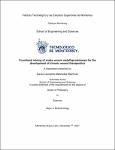| dc.contributor.advisor | Licona Cassani, Cuauhtémoc | |
| dc.contributor.author | Meléndez Martínez, David Leonardo | |
| dc.creator | MELENDEZ MARTINEZ, DAVID LEONARDO; 548216 | |
| dc.date.accessioned | 2023-02-15T19:42:51Z | |
| dc.date.available | 2023-02-15T19:42:51Z | |
| dc.date.issued | 2021-10 | |
| dc.identifier.citation | Meléndez Martínez, D. (2021). Functional mining of snake venom metalloproteinases for the development of chronic wound therapeutics (Disertación doctoral). Instituto Tecnológico y de Estudios Superiores de Monterrey. Recuperado de: https://hdl.handle.net/11285/650157 | es_MX |
| dc.identifier.doi | 10.3892/br.2020.1300 | |
| dc.identifier.doi | 10.3390/molecules25153401 | |
| dc.identifier.uri | https://hdl.handle.net/11285/650157 | |
| dc.description | https://orcid.org/0000-0002-0360-3945 | es_MX |
| dc.description.abstract | Chronic wounds such as skin burns, diabetic and varicose ulcers are a health problem in Mexico, generating the loss of millions of dollars in annual expenses. From the currently available treatments in the market, active wound treatments are the best cost-benefit option to treat this pathology and its market is in a rapid growth. Nowadays, several proteinases such as papain, bromelain or bacterial collagenases have been employed to enhance the wound healing process. Nevertheless, the use of these proteinases demonstrated poor results in patients. For this reason, other proteinase sources with more similarity to matrix metalloproteinases, plasmin and thrombin have been explored. Thus, this dissertation presents a characterization of snake venom metalloproteinases (SVMPs) and snake venom serine proteinases (SVSPs) from the Mexican rattlesnakes Crotalus atrox, C. molossus nigrescens, C. ornatus and C. scutulatus scutulatus; including the development of an aqueous two phase systems (ATPS) method for the selective recovery of SVMPs and phospholipases A2 (PLA2) from rattlesnake venom. More importantly, the generation of a phylogenetic-based tool that can be used to discriminate among hemorrhagic and non-hemorrhagic SVMPs. The results demonstrated that the SVMPs and SVSPs contained in the Mexican rattlesnakes are capable to degrade collagen derivatives (gelatin), fibrin, fibrinogen and generate fibrin clots. Three ATPS were capable to selectively recover: 1) PLA2 (PEG 400 g mol-1, VR 1, TLL 25%, and pH 7.0), 2) P-III SVMPs (PEG 400 g mol-1, VR 1, TLL 15%, pH 7.0, and NaCl 1%) and 3) SVMPs (PEG 400 g mol-1, VR 1, TLL 25, and pH 8.5). Lastly, specificity loop flexibility is involved in the hemorrhagic activity of the SVMPs. Using this data to trim the SVMP sequences in the phylogeny-based analysis, a hemorrhagic phenotype clustering was observed. Together, all these results contribute to improve in the venom inspired drug discovery, demonstrating that the rattlesnake venom toxins, particularly the SVMPs have the potential as an active wound treatment for chronic wounds. | es_MX |
| dc.format.medium | Texto | es_MX |
| dc.language.iso | eng | es_MX |
| dc.publisher | Instituto Tecnológico y de Estudios Superiores de Monterrey | es_MX |
| dc.relation | Tecnológico de Monterrey | es_MX |
| dc.relation | Strain Biotech | es_MX |
| dc.relation.isFormatOf | draft | es_MX |
| dc.relation.isreferencedby | REPOSITORIO NACIONAL CONACYT | |
| dc.rights | openAccess | es_MX |
| dc.rights.uri | http://creativecommons.org/licenses/by/4.0 | es_MX |
| dc.subject.classification | CIENCIAS AGROPECUARIAS Y BIOTECNOLOGÍA::CIENCIAS AGRARIAS | es_MX |
| dc.subject.lcsh | Science | es_MX |
| dc.title | Functional mining of snake venom metalloproteinases for the development of chronic wound therapeutics | es_MX |
| dc.type | Tesis Doctorado / doctoral Thesis | es_MX |
| dc.contributor.department | Escuela de Ingenieria y Ciencias | es_MX |
| dc.contributor.committeemember | Mayolo Deloisa, Karla | |
| dc.contributor.committeemember | Borja Jiménez, Juan Miguel | |
| dc.contributor.committeemember | Plisson, Fabien | |
| dc.contributor.mentor | Aguilar Yáñez, José Manuel | |
| dc.identifier.orcid | https://orcid.org/0000-0003-3643-2668 | es_MX |
| dc.subject.keyword | Snake venom metalloproteinases | es_MX |
| dc.subject.keyword | Aqueous two phase systems | es_MX |
| dc.subject.keyword | Chronic wound healing | es_MX |
| dc.subject.keyword | Functional mining | es_MX |
| dc.subject.keyword | Phylogeny-based prediction | es_MX |
| dc.subject.keyword | Crotalus | es_MX |
| dc.contributor.institution | Campus Monterrey | es_MX |
| dc.contributor.cataloger | emijzarate, emipsanchez | es_MX |
| dc.description.degree | Doctor en Biotecnología | es_MX |
| dc.identifier.cvu | 548216 | es_MX |
| dc.date.accepted | 2021-11-30 | |
| dc.audience.educationlevel | Investigadores/Researchers | es_MX |
| dc.identifier.scopusid | 57194058534 | es_MX |
| dc.identificator | 6||31 | es_MX |



